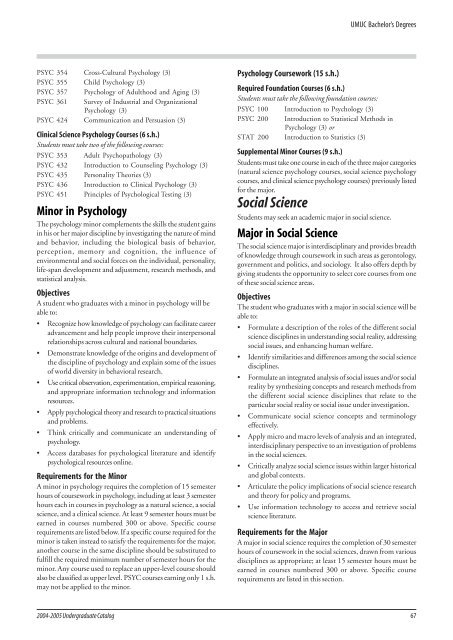Statements of Policy - UMUC Europe
Statements of Policy - UMUC Europe
Statements of Policy - UMUC Europe
Create successful ePaper yourself
Turn your PDF publications into a flip-book with our unique Google optimized e-Paper software.
PSYC 354 Cross-Cultural Psychology (3)<br />
PSYC 355 Child Psychology (3)<br />
PSYC 357 Psychology <strong>of</strong> Adulthood and Aging (3)<br />
PSYC 361 Survey <strong>of</strong> Industrial and Organizational<br />
Psychology (3)<br />
PSYC 424 Communication and Persuasion (3)<br />
Clinical Science Psychology Courses (6 s.h.)<br />
Students must take two <strong>of</strong> the following courses:<br />
PSYC 353 Adult Psychopathology (3)<br />
PSYC 432 Introduction to Counseling Psychology (3)<br />
PSYC 435 Personality Theories (3)<br />
PSYC 436 Introduction to Clinical Psychology (3)<br />
PSYC 451 Principles <strong>of</strong> Psychological Testing (3)<br />
Minor in Psychology<br />
The psychology minor complements the skills the student gains<br />
in his or her major discipline by investigating the nature <strong>of</strong> mind<br />
and behavior, including the biological basis <strong>of</strong> behavior,<br />
perception, memory and cognition, the influence <strong>of</strong><br />
environmental and social forces on the individual, personality,<br />
life-span development and adjustment, research methods, and<br />
statistical analysis.<br />
Objectives<br />
A student who graduates with a minor in psychology will be<br />
able to:<br />
• Recognize how knowledge <strong>of</strong> psychology can facilitate career<br />
advancement and help people improve their interpersonal<br />
relationships across cultural and national boundaries.<br />
• Demonstrate knowledge <strong>of</strong> the origins and development <strong>of</strong><br />
the discipline <strong>of</strong> psychology and explain some <strong>of</strong> the issues<br />
<strong>of</strong> world diversity in behavioral research.<br />
• Use critical observation, experimentation, empirical reasoning,<br />
and appropriate information technology and information<br />
resources.<br />
• Apply psychological theory and research to practical situations<br />
and problems.<br />
• Think critically and communicate an understanding <strong>of</strong><br />
psychology.<br />
• Access databases for psychological literature and identify<br />
psychological resources online.<br />
Requirements for the Minor<br />
A minor in psychology requires the completion <strong>of</strong> 15 semester<br />
hours <strong>of</strong> coursework in psychology, including at least 3 semester<br />
hours each in courses in psychology as a natural science, a social<br />
science, and a clinical science. At least 9 semester hours must be<br />
earned in courses numbered 300 or above. Specific course<br />
requirements are listed below. If a specific course required for the<br />
minor is taken instead to satisfy the requirements for the major,<br />
another course in the same discipline should be substituted to<br />
fulfill the required minimum number <strong>of</strong> semester hours for the<br />
minor. Any course used to replace an upper-level course should<br />
also be classified as upper level. PSYC courses earning only 1 s.h.<br />
may not be applied to the minor.<br />
Psychology Coursework (15 s.h.)<br />
<strong>UMUC</strong> Bachelor’s Degrees<br />
Required Foundation Courses (6 s.h.)<br />
Students must take the following foundation courses:<br />
PSYC 100 Introduction to Psychology (3)<br />
PSYC 200 Introduction to Statistical Methods in<br />
Psychology (3) or<br />
STAT 200 Introduction to Statistics (3)<br />
Supplemental Minor Courses (9 s.h.)<br />
Students must take one course in each <strong>of</strong> the three major categories<br />
(natural science psychology courses, social science psychology<br />
courses, and clinical science psychology courses) previously listed<br />
for the major.<br />
Social Science<br />
Students may seek an academic major in social science.<br />
Major in Social Science<br />
The social science major is interdisciplinary and provides breadth<br />
<strong>of</strong> knowledge through coursework in such areas as gerontology,<br />
government and politics, and sociology. It also <strong>of</strong>fers depth by<br />
giving students the opportunity to select core courses from one<br />
<strong>of</strong> these social science areas.<br />
Objectives<br />
The student who graduates with a major in social science will be<br />
able to:<br />
• Formulate a description <strong>of</strong> the roles <strong>of</strong> the different social<br />
science disciplines in understanding social reality, addressing<br />
social issues, and enhancing human welfare.<br />
• Identify similarities and differences among the social science<br />
disciplines.<br />
• Formulate an integrated analysis <strong>of</strong> social issues and/or social<br />
reality by synthesizing concepts and research methods from<br />
the different social science disciplines that relate to the<br />
particular social reality or social issue under investigation.<br />
• Communicate social science concepts and terminology<br />
effectively.<br />
• Apply micro and macro levels <strong>of</strong> analysis and an integrated,<br />
interdisciplinary perspective to an investigation <strong>of</strong> problems<br />
in the social sciences.<br />
• Critically analyze social science issues within larger historical<br />
and global contexts.<br />
• Articulate the policy implications <strong>of</strong> social science research<br />
and theory for policy and programs.<br />
• Use information technology to access and retrieve social<br />
science literature.<br />
Requirements for the Major<br />
A major in social science requires the completion <strong>of</strong> 30 semester<br />
hours <strong>of</strong> coursework in the social sciences, drawn from various<br />
disciplines as appropriate; at least 15 semester hours must be<br />
earned in courses numbered 300 or above. Specific course<br />
requirements are listed in this section.<br />
2004-2005 Undergraduate Catalog 67






